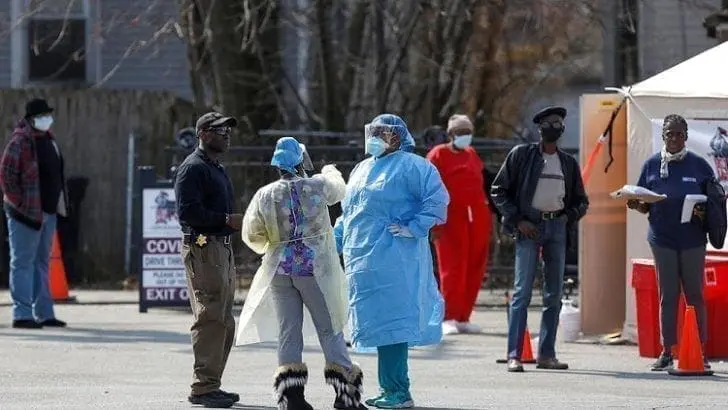Coronavirus: A Wake-up call for Kenyans living in America

Most Kenyans living in the US are having a difficult time coping with the challenges brought about by the coronavirus (Covid-19) pandemic.
As the number of diagnosed cases and deaths rises, it is taking a toll on all aspects that define a normal life. The over 120,000 Kenyans scattered in the country are feeling the pinch, from a nurse on the front line to an Uber driver with no customers to a babysitter out of work.
Among the many issues perturbing Kenyans are the insecurity and anxiety that come with being far from home and loved ones, the fear of falling behind with mortgages and house rent and joblessness, and the threat of staring death in the face.
Many Kenyan immigrants work in hospitals and elderly centres — where the pandemic is most rampant. And the disease is disproportionately killing the black community, which accounts for more than a third of all coronavirus-related cases, despite being minorities.
According to the US Centers for Disease Control and Prevention (CDC), there are over half a million cases in America to date and over 20,000 deaths, the world’s highest.
Ninety-five per cent of the country is on lockdown. President Donald Trump declared a national emergency on March 13 but left it to governors’ discretion to decide on lockdowns, while pushing for reopening soon as the economy bleeds.
As the crisis escalates, businesses close and families are put on lockdown, so do joblessness and anxiety rise among Kenyans.
Some 3,000 of them are based in New York, a state of 8.3 million people with the largest and most densely populated city in America. The first case was confirmed on March 1, and since then it has grown exponentially, despite school and business closures that have turned New York into a ghost town.
There are now more coronavirus cases in New York alone than in any country outside the US. The state is opening temporary hospitals, repurposing refrigerator trucks as makeshift morgues, and using mass graves on Hart Island to bury some of the dead.
Remarking on how the death toll has overtaken 9/11’s, Governor Andrew Cuomo said, “There was no explosion, but it was a silent explosion that just ripples through society with the same randomness, the same evil that we saw on 9/11.”
I took all the necessary measures to protect myself. I wore masks, gowns, sanitised and washed hands often, yet I still got sick
KENYANS ON EDGE
Jennifer, a UN staff member in New York, said social distancing, working and living in the same place is not easy.
“I am just struggling to keep sane. One of my biggest challenges is to convince my family I am not home on holiday, but I have to be locked up to work,” she said.
Jennifer is an IT officer. She spends most of her day troubleshooting systems and guiding staff on access to remote software needed for their work.
Like in the animal farm, not all animals are equal. Not everyone has the privilege of working from home.
Daniel is a nurse at a health facility in Boston, Massachusetts. When the pandemic struck, he noticed a rise in the number of patients with respiratory issues.
His calling as a nurse made him wake up and report to work every day. He was assigned patients who were either already diagnosed with Covid-19 or were asymptomatic. Despite taking all precautions, he still got sick.
“I took all the necessary measures to protect myself. I wore masks, gowns, sanitised and washed hands often, yet I still got sick,” he says in a hoarse voice from his basement, where he has been in isolation for seven days.
Nurses on front line of Covid-19 war need everyone’s support
Daniel says the symptoms are similar to a common cold: a running nose, dry cough and breathlessness. He was tested positive for the coronavirus on the third day of showing symptoms. His family is also showing symptoms and they are on a 14-day quarantine.
Daniel is concerned he will fall behind with his mortgage payment. “This means none of my family members is going to work and if I do not pay my mortgage, the interest will keep accruing,” he says.
He is, however, grateful he had already stocked enough groceries. He is looking forward to getting better and going back to work.
My greatest fear now is not bumping into immigration officials but keeping safe and healthy, so I can return home to my family in one piece
Jane, who has been in the US for 10 years
BETWEEN ROCK AND HARD PLACE
The pandemic has led many Kenyans to re-examine their priorities. Those who have not returned home for years now feel caged. While their greatest challenge has been to keep safe boundaries with the immigration officials, this pandemic has posed an unprecedented challenge.
Even if they wanted to go back home right away, the termination of international flights locks them in the United States, at least until the pandemic is over.
Jane has been in the US for 10 years and has not been able to return home. “This pandemic is a wake-up call for me,” she said. “My greatest fear now is not bumping into immigration officials but keeping safe and healthy, so I can return home to my family in one piece.”
According to a report issued on April 7 by the International Labor Organisation (ILO), the Covid-19 crisis is expected to “wipe out” 6.7 per cent of working hours globally in the second quarter of 2020. This is equivalent to 195 million full-time workers. These numbers do not spare the Kenyans working in the US.
Sheila and her husband Jealan run an Uber business at the JFK Airport in New York. Due to the pandemic, social distancing rules and the risks posed by the Uber business, this Kenyan couple had to forfeit the business and look for alternatives.
“Both our Uber vehicles are on loan. The leasing company needs the monthly payment and so does our landlord. This business cannot sustain us now,” Sheila says.
She says the alternative is to return the leased car and file unemployment benefits — a programme that allows her as a permanent resident to obtain food and some subsided rental support.
Not everyone has a fall-back plan like Sheila and Jealan. For those without legal status, there is nowhere to turn. Government aid is meant for all those who are legally documented and pay back taxes and their employers pay unemployment benefits.
Those who do odd jobs for individuals, such as babysitting and cleaning, are the most affected by the pandemic since they cannot claim social or unemployment benefits.
A DAY AT A TIME
Many diaspora people in the US concentrate on investing at home and living one day at a time.
Joyce is a babysitter in New York City. When the pandemic broke, her bosses moved to a summer house in another town and left her jobless. She could not get another job in such a short time and stays home all day.
By Elizabeth Mwarage







